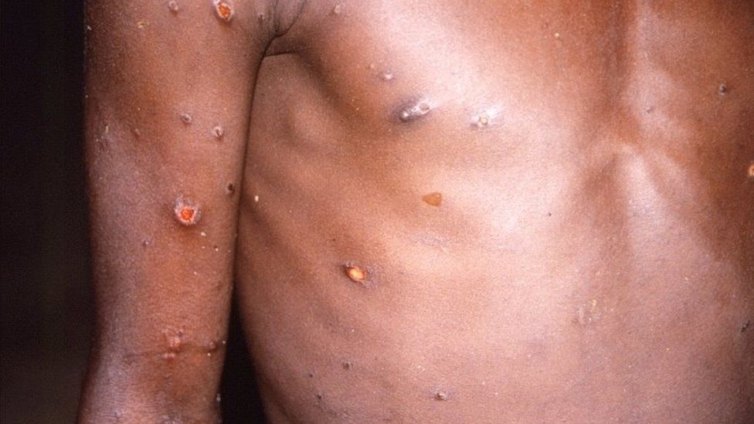Ghana has officially recorded cases of the Monkeypox virus.
The Ghana Health Service says five cases have been confirmed in the Eastern, Bono and Greater Accra regions.
In view of this, Myjoyonline.com explores ways you, our cherished reader, can stay safe:
Origin
The Monkeypox virus was first identified in the State Serum Institute in Copenhagen, Denmark, in 1958 during an investigation into a pox-like disease among monkeys.
But it was first identified in humans in 1970 in Zaire (now known as the Democratic Republic of Congo) in a 9-year-old boy in a region where smallpox had been eliminated in 1968.
In the spring of 2003, monkeypox cases were confirmed in the Midwest of the United States of America, marking the first reported occurrence of the disease outside of the African continent.
Most of the patients had had close contact with pet prairie dogs.
Infection
Infection results from direct contact with the blood, bodily fluids, or cutaneous or mucosal lesions of infected animals.
Human infections have also been documented through the handling of infected monkeys, rats and squirrels, with rodents being the major reservoir of the virus.
Eating inadequately cooked meat of infected animals is a possible risk factor.
Transmission
Transmission occurs primarily via droplet respiratory particles usually requiring prolonged face-to-face contact, which puts household members of active cases at greater risk of infection.
Transmission can also occur by inoculation or via the placenta (congenital monkeypox). There is no evidence, to date, that person-to-person transmission alone can sustain monkeypox infections in the human population
Secondary, or human-to-human, transmission can result from close contact with infected respiratory tract secretions, skin lesions (open wounds/injuries) of an infected person or objects recently contaminated by patient fluids or lesion materials.
Duration
The incubation period (interval from infection to onset of symptoms) of monkeypox is usually from 6 to 16 days but can range from 5 to 21 days.
Monkeypox is usually a self-limited disease with the symptoms lasting from 14 to 21 days.
Symptoms
The infection can be divided into two periods:
The invasion period (0-5 days) characterised by fever, intense headache, lymphadenopathy (swelling of the lymph node), back pain, myalgia (muscle ache) and an intense asthenia (lack of energy);
The skin eruption period (within 1-3 days after the appearance of fever) where the various stages of the rash appears, often beginning on the face and then spreading elsewhere on the body.
The face (in 95% of cases), and palms of the hands and soles of the feet (75%) are most affected.
Risk Factor
People living in or near forest areas may have indirect or low-level exposure to infected animals, possibly leading to subclinical (asymptomatic) infection.
The case fatality has varied widely between epidemics but has been less than 10% in documented events, mostly among young children. In general, younger age-groups appear to be more susceptible to monkeypox.
Diagnosis
Monkeypox can only be diagnosed definitively in the laboratory where the virus can be identified by a number of different tests.
The differential diagnoses that must be considered include other rash illnesses, such as, smallpox, chickenpox, measles, bacterial skin infections, scabies, syphilis, and medication-associated allergies.
Treatment/Vaccine
There are no specific treatments or vaccines available for monkeypox infection, but outbreaks can be controlled.
Vaccination against smallpox has been proven to be 85% effective in preventing monkeypox in the past but the vaccine is no longer available to the general public after it was discontinued following global smallpox eradication.
Prevention
In the absence of specific treatment or vaccine, the only way to reduce infection in people is by raising awareness of the risk factors and educating people about the measures they can take to reduce exposure to the virus.
Regular hand washing should be carried out after caring for or visiting sick people.
Reducing the risk of animal-to-human transmission. Efforts to prevent transmission in endemic regions should focus on thoroughly cooking all animal products (blood, meat) before eating.
Public health educational messages via the media – broadcast, electronic and social – is highly advised.
Healthcare workers and those treating or exposed to patients with monkeypox or their samples should consider being immunized against smallpox via their national health authorities.
Latest Stories
-
At least 21 killed in crash in Mexico, official says
2 hours -
I’m far from quitting as Man Utd coach – Amorim
2 hours -
Trader faces court for injuring carpenter’s eye in GH¢200 dispute
2 hours -
Police arrest 4 over death of Momo vendor
2 hours -
‘He will learn from it’ – Isaac Adongo defends Sammy Gyamfi over dollar giveaway saga
2 hours -
‘He’s a shining star who made an error’ – Adongo defends Sammy Gyamfi over dollar video
3 hours -
Putin not on Kremlin list of officials attending Ukraine peace talks in Turkey
3 hours -
Trump’s critics and supporters unite against Qatar plane deal
4 hours -
Empowering rural women through aquaculture: KIC’s alternative livelihood approach
4 hours -
Mark Carney says Canadians are not ‘impressed’ by UK’s invite to Trump
4 hours -
Prosper Kuyipwah: Treasurers are evolving. Their banks must too
4 hours -
Public health risk as local manufacturers warn of dangerous diaper imports
5 hours -
Accra’s luxury apartment market: Trends and 2025 outlook
5 hours -
Obaapanin Akosua Anima (aka Hannah Owusu): One Week Observance
5 hours -
Sadiq Abubakar confirmed as Old Tafo MCE with 100% endorsement
5 hours

